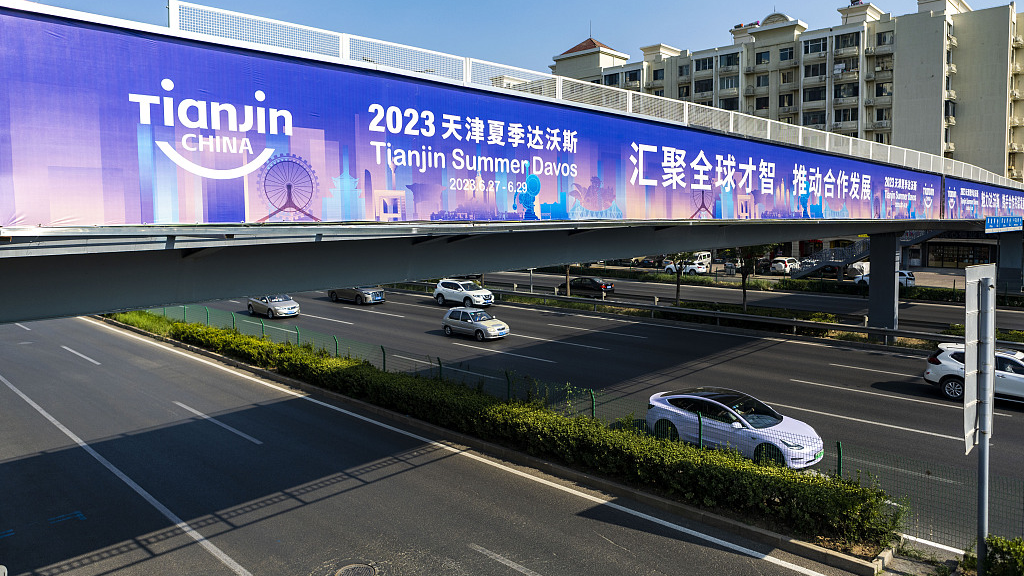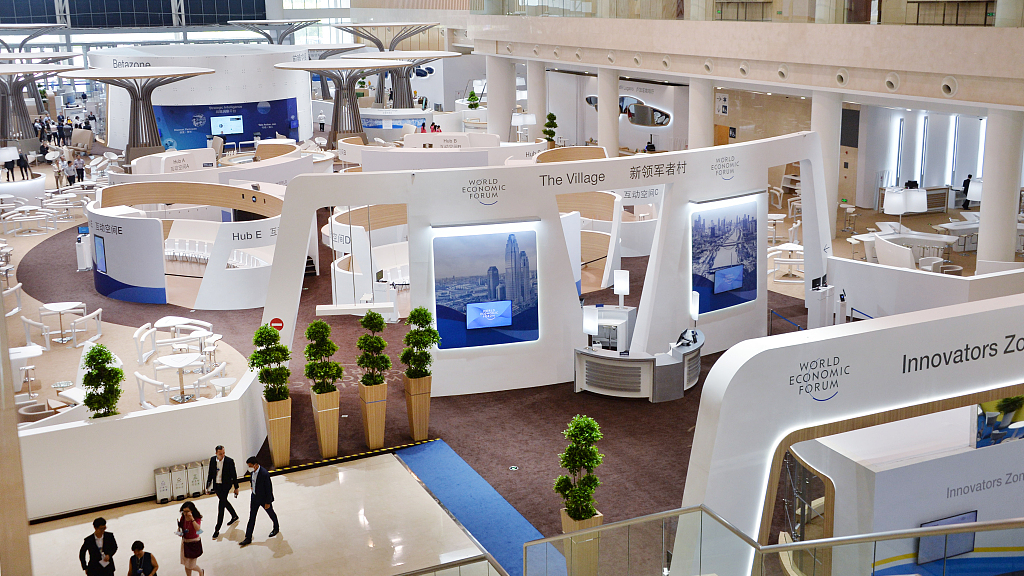
A banner of the Summer Davos Forum 2023 on an overpass in north China's Tianjin Municipality, June 26, 2023. /CFP
A banner of the Summer Davos Forum 2023 on an overpass in north China's Tianjin Municipality, June 26, 2023. /CFP
Editor's note: Hamzah Rifaat Hussain, a special commentator on current affairs for CGTN, is a host for ThinkTech Hawaii.The article reflects the author's opinions and not necessarily the views of CGTN.
The Summer Davos Forum of 2023 in Tianjin, which marks its continuation in China after four years, is a grand opportunity for the international community to devise strategic solutions to promote entrepreneurship, post-pandemic economic resilience, and innovation in Asia and beyond.
"The business interest we have received for the summit shows that there is a lot of keenness for opportunities in China in a post-COVID context," said President of the World Economic Forum (WEF), Borge Brende.
The forum is a testament to the possibilities of leveraging multilateralism, meaningful cooperation, and apolitical understandings between member states for a more resilient world order. It also stands in stark contrast to nefarious designs pursued by hegemonic powers, which promote polarization and divisions in regions such as Asia-Pacific.
The theme of this year's forum is "Entrepreneurship: The Driving Force of the Global Economy" and covers six key pillars for global sustainability including deploying innovation, safeguarding nature and climate, post-pandemic consumers, rewiring growth, leveraging China in the global context, and energy transitions and materials. Close to 1,500 participants ranging from the business community, civil societies, international organizations, and the academia from nearly 90 countries, according to the WEF, are attending the forum.

The venue of the Summer Davos Forum 2023 at Meijiang Convention and Exhibition Center in north China's Tianjin Municipality, June 25, 2023. /CFP
The venue of the Summer Davos Forum 2023 at Meijiang Convention and Exhibition Center in north China's Tianjin Municipality, June 25, 2023. /CFP
While innovative strategies for the sustainable development of the global economy are a step in the right direction, unilateral, nefarious designs by states choking economic development for narrow, parochial interests need to be shelved. As pointed out by the WEF chief, 30 percent of global growth depends on the success of the Chinese economy.
However, the United States, through economically blockading Beijing's growth rate, is compromising both prospects of global growth and resuscitating the world economy. The Joe Biden administration, for example, has opted to impose export controls to prevent China from accessing high-end semiconductors while subsidizing its own high technology and green industries.
Furthermore, the United States is planning on introducing new restrictions on American companies funding advancing computing technologies in China, as per The New York Times. Such recklessness of U.S. policy towards China will have a detrimental impact on the growth in Asia and worldwide.
The Summer Davos Forum 2023, on the other hand, is slated to stimulate the spirit of the Asian economy instead of regressing it as the host country China's economy has performed well domestically and some participating countries in the forum such as Saudi Arabia, which sent a 24-strong delegation, have shown a keenness to benefit from Chinese assistance to develop their industries ranging from steel, tourism to digital platforms.
These efforts to assist member states in overcoming financial obstacles and promote the health and sustainable development of the world economy can be contrasted with the American obsession with promoting confrontations in Asia-Pacific.
The U.S.'s so-called Indo-Pacific Strategy, for example, continues to receive a massive boost, considering the Biden administration recently sent the nuclear-powered aircraft carrier USS Ronald Reagan to Danang, Vietnam, which is the latest evidence of the U.S. sowing discord instead of answering questions on the future trajectory of the Asian economy.
The truth is that American initiatives such as AUKUS and the Quad, promoting "freedom,""autonomy" and "options" for states come under the garb of promoting militarization. This is not, and never will be a recipe for success.
Contrastingly, the Summer Davos Forum 2023 is further evidence of the international community moving towards de-escalation of tensions, innovation, technological cooperation, and economic prosperity. The forum seeks to build on mutual understandings by capitalizing on the promise of the Chinese economy, which accounts for 30 percent of global growth. As further acknowledged by the WEF chief, this forum provides an opportunity for startup companies to form partnerships with Chinese and global companies.
With more than 25 initiatives and coalitions to be launched or advanced at the meeting, the Summer Davos Forum 2023 is a step towards constructivism instead of polarization.
(If you want to contribute and have specific expertise, please contact us at opinions@cgtn.com. Follow @thouse_opinions on Twitter to discover the latest commentaries in the CGTN Opinion Section.)